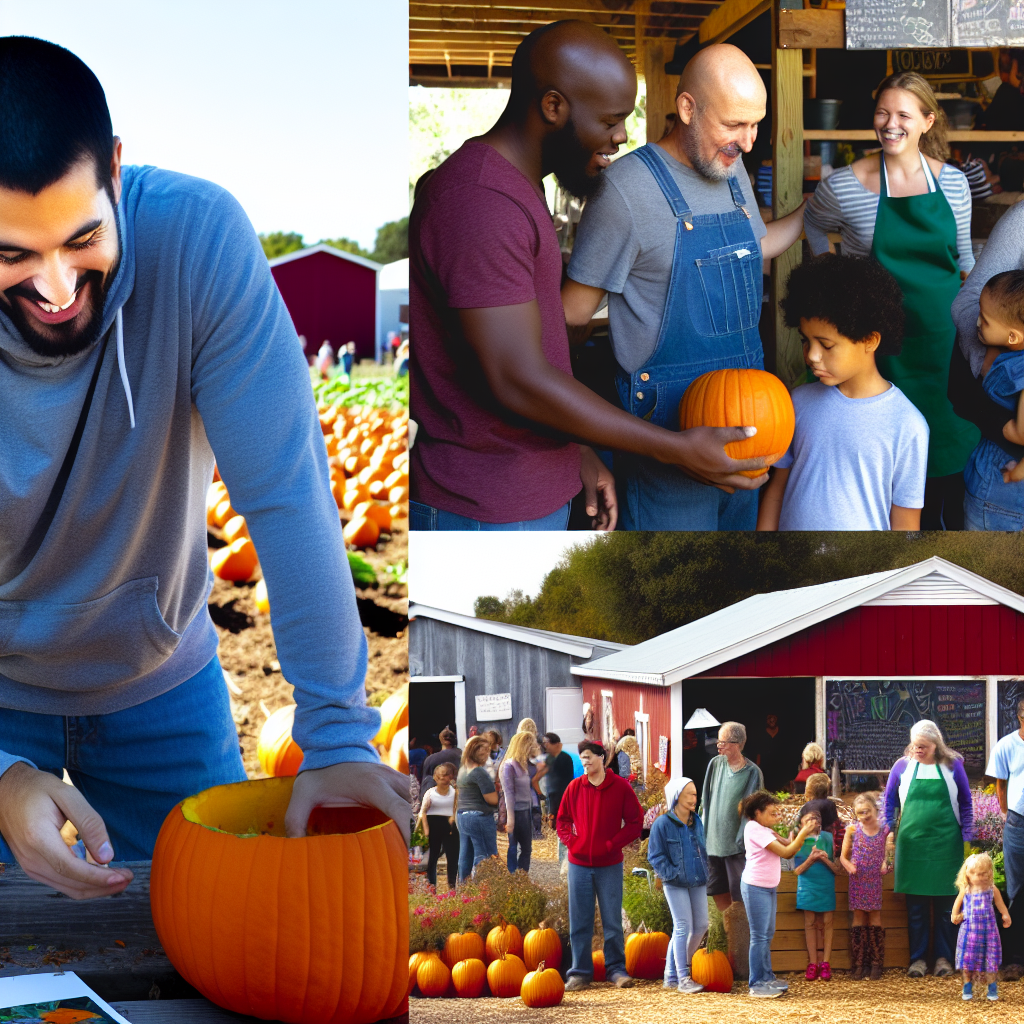Introduction to Agri-Tourism and its Importance in Community Building
Agri-tourism connects agriculture and tourism in meaningful ways.
This initiative benefits farmers, local businesses, and communities.
By promoting local agricultural practices, agri-tourism cultivates a stronger local identity.
It fosters appreciation for farming and local culture among visitors.
Understanding Agri-Tourism
Agri-tourism involves farm-based activities to attract visitors.
Farm stays, tours, and seasonal events form the backbone of this initiative.
Participating farmers diversify their income through agri-tourism.
Thus, they can withstand market fluctuations more effectively.
Building Community Connections
Agri-tourism brings people together in unique settings.
Visitors engage directly with farmers and their practices.
This interaction creates bonds and fosters mutual understanding.
As a result, local residents also benefit from increased foot traffic.
Supporting Local Economies
Agri-tourism stimulates local economies by creating jobs.
Farmers hire staff to manage tours and events, increasing employment rates.
Restaurants and shops benefit from the influx of visitors.
Transform Your Agribusiness
Unlock your farm's potential with expert advice tailored to your needs. Get actionable steps that drive real results.
Get StartedThis economic boost strengthens the entire community.
Promoting Sustainability
Agri-tourism encourages sustainable farming practices.
Visitors learn about environmentally friendly techniques.
This promotes a culture of sustainability within the community.
Communities can thus showcase their commitment to preserving local resources.
Enhancing Cultural Heritage
Agri-tourism highlights the unique cultural aspects of a region.
Farmers can showcase traditional methods of production and local cuisine.
This enhances visitors’ experience while preserving cultural heritage.
Communities can thrive by sharing their rich histories.
Benefits of Agri-Tourism for Local Farmers and Producers
Increased Revenue Opportunities
Agri-tourism creates new revenue streams for local farmers.
Farmers can diversify their income by offering tours and experiences.
Activities such as pumpkin picking and farm stays attract visitors.
This engagement allows farmers to sell their products directly.
Enhanced Community Awareness
Agri-tourism helps raise awareness about local agriculture.
Visitors learn about farming practices and the importance of food sources.
Educational tours foster appreciation for local producers.
Strong community ties develop when people understand farming contributions.
Improved Farm Preservation
Tourism initiatives encourage farmers to preserve their land and traditions.
Tourist interest often leads to better farm management practices.
As a result, land sustainability becomes a priority for many producers.
Support for Local Economy
Agri-tourism generates additional jobs within the community.
Local businesses benefit from increased tourism traffic.
Restaurants, shops, and hotels see higher demand during peak seasons.
This economic boost strengthens the overall community financial health.
Showcase Your Farming Business
Publish your professional farming services profile on our blog for a one-time fee of $200 and reach a dedicated audience of farmers and agribusiness owners.
Publish Your ProfilePromotion of Local Products
Agri-tourism showcases local products and crafts.
Farmers can offer tastings of their produce to visitors.
This exposure leads to increased sales and customer loyalty.
Visitors often become advocates for local brands upon returning home.
Exploring the Economic Impact of Agri-Tourism on Rural Communities
Increased Revenue Streams
Agri-tourism creates new revenue opportunities for farmers and ranchers.
Visitors often pay for experiences such as farm tours and pick-your-own fruit days.
These activities help diversify income, reducing reliance on traditional farming.
In addition, local businesses benefit from increased foot traffic and spending.
Job Creation in Rural Areas
Agri-tourism contributes to job creation in rural regions.
New positions arise in hospitality, retail, and tour guiding.
Many farms employ seasonal workers during peak tourism seasons.
This influx of employment opportunities helps revitalize struggling communities.
Strengthening Local Markets
Agri-tourism enhances local farmer’s market visibility.
Tourists purchasing local products stimulate demand for regionally produced goods.
This not only benefits farmers but also encourages sustainable practices.
In turn, strong local markets promote community identity and pride.
Community Engagement and Development
Agri-tourism fosters community engagement through events and festivals.
Farmers often collaborate with local organizations to host special events.
Such gatherings create social bonds among residents and visitors alike.
Additionally, they promote cultural heritage and local traditions.
Challenges and Considerations
Despite its benefits, agri-tourism has challenges that must be addressed.
Land use can become contentious between farming and tourism purposes.
Moreover, infrastructure may require upgrades to handle increased visitors.
Stakeholders need to balance tourism growth with agricultural viability.
Find Out More: Designing Your Farm for an Agri-Tourism Experience
Creating Unique Experiences: Activities and Attractions in Agri-Tourism
Farm Tours and Experiences
Farm tours offer visitors a firsthand look at agricultural practices.
They connect consumers with the sources of their food.
Local farms often highlight seasonal crops during tours.
Guided experiences can include berry picking or vegetable harvesting.
These activities engage guests in the farming process.
Educational sessions on sustainable farming practices are also popular.
Workshops and Classes
Workshops on cooking, preserving, or gardening can attract diverse audiences.
Participants learn new skills while enjoying farm-fresh ingredients.
Herb gardening classes are especially popular among urban dwellers.
Additionally, craft workshops may focus on creating products using farm materials.
Local artisans might teach workshops in pottery and textile arts.
Seasonal Festivals and Events
Seasonal festivals celebrate crops and local culture.
Harvest festivals bring communities together for food and fun.
Visitors enjoy activities like hayrides, corn mazes, and live music.
These events also showcase local artisans and vendors.
Showcase Your Farming Business
Publish your professional farming services profile on our blog for a one-time fee of $200 and reach a dedicated audience of farmers and agribusiness owners.
Publish Your ProfileFurthermore, holiday events attract families and tourists alike.
Agritainment: Fun for All Ages
Agritainment combines agriculture and entertainment to engage families.
Many farms offer petting zoos and interactive animal experiences.
Kids can learn about farm animals through hands-on activities.
Obstacle courses and playgrounds enrich the visitor experience.
Planned family-friendly activities ensure fun for all ages.
Agricultural Education Programs
Education programs connect local schools with farming initiatives.
Field trips allow students to experience agriculture firsthand.
Workshops focus on nutrition, sustainability, and farming practices.
Schools can partner with farms for year-round educational opportunities.
This approach promotes awareness of food sources and environmental issues.
Delve into the Subject: Choosing the Right CSA for Your Farm’s Needs
Collaborative Efforts: Partnerships between Farmers, Local Businesses, and Government
Importance of Collaboration
Collaboration enhances the effectiveness of agri-tourism initiatives.
It brings together diverse resources and expertise.
This partnership fosters community engagement and support.
Moreover, it promotes local economic growth and sustainability.
Building Strong Local Networks
Effective partnerships begin with building strong local networks.
Farmers can connect with local businesses to create unique offerings.
For instance, farms can collaborate with restaurants for farm-to-table experiences.
This not only highlights local produce but also attracts tourists.
Engaging the Government
Government support plays a crucial role in agri-tourism success.
Local authorities can provide funding and resources.
They can also assist with marketing efforts and regulations.
This collaboration enhances the visibility of local tourism initiatives.
Examples of Successful Collaborations
Many regions showcase successful collaborations in agri-tourism.
The Green Valley Farmers’ Market partners with local artisans.
This initiative creates a vibrant community hub.
Additionally, the Sunset Ridge Farm works with local businesses.
They offer various workshops, boosting local participation.
Benefits to the Community
Collaborative efforts in agri-tourism benefit the entire community.
They create job opportunities through tourism-related activities.
Moreover, they enhance local infrastructure and services.
Communities that embrace agri-tourism often see increased revenue.
Future Opportunities for Growth
Looking ahead, there are many opportunities for expanding collaborations.
Farmers can explore partnerships with wellness and eco-tourism sectors.
Local festivals can feature agricultural themes to attract more visitors.
Furthermore, educational initiatives can promote sustainable farming practices.
Uncover the Details: Integrating Permaculture into Small-Scale Farming
Marketing Strategies for Promoting Agri-Tourism Initiatives
Leveraging Social Media Platforms
Social media platforms are powerful tools for promoting agri-tourism initiatives.
Create engaging content that highlights the unique aspects of your offerings.
Showcase Your Farming Business
Publish your professional farming services profile on our blog for a one-time fee of $200 and reach a dedicated audience of farmers and agribusiness owners.
Publish Your ProfileUse eye-catching images of your farm, activities, and local produce.
Additionally, share stories featuring visitors’ experiences on the farm.
Using hashtags relevant to agriculture and tourism boosts visibility.
Encouraging visitors to share their experiences also enhances reach.
Building Partnerships with Local Businesses
Collaborate with local businesses to create mutually beneficial partnerships.
Consider teaming up with restaurants, hotels, and travel agencies.
Bundle tours with accommodations or dining experiences in the area.
This approach helps cross-promote each other’s services effectively.
Synergistic marketing can amplify community engagement.
Offering Unique Experiences
Creating memorable experiences attracts visitors to your agri-tourism initiative.
Consider offering workshops on cooking, gardening, or sustainable farming.
Host special events such as harvest festivals or farm-to-table dinners.
Incorporate educational elements to make experiences informative.
Unique offerings set your initiative apart from competitors.
Utilizing Email Marketing Campaigns
Email marketing remains a cost-effective strategy for reaching potential visitors.
Build an email list through your website or social media campaigns.
Send regular newsletters featuring upcoming events and special promotions.
Highlight new offerings, visitor testimonials, and seasonal activities.
Email campaigns help stay connected with your audience over time.
Creating Engaging Content on Your Website
Your website serves as the central hub for information about your initiative.
Include a blog that highlights farming techniques, recipes, or success stories.
Ensure your site is mobile-friendly for browsing on various devices.
Incorporate an online booking system to streamline visitor reservations.
A well-structured website enhances visitor engagement and conversion rates.
Encouraging Visitor Feedback and Reviews
Invite visitors to provide feedback and share their experiences.
Positive reviews can significantly influence potential customers.
Feature testimonials prominently on your website and marketing materials.
Responding to feedback shows that you value your visitors’ input.
Encouraging ratings on platforms like TripAdvisor can boost credibility.
Uncover the Details: Local Food Sourcing: A Guide for New Farmers

Engaging the Community: Involving Residents in Agri-Tourism Projects
Recognizing Local Talent
Every community has passionate individuals willing to share their skills.
Identifying these local talents can enrich agri-tourism initiatives.
For example, artists can display their work at local farms.
Additionally, cooks can offer cooking demonstrations using local ingredients.
Creating Collaborative Projects
Collaboration strengthens the community around agri-tourism efforts.
By partnering with local schools, farms can host educational programs.
These programs can teach children about agriculture and sustainability.
Moreover, local businesses can sponsor events to promote mutual growth.
Involving Residents in Decision-Making
Engaging residents fosters a sense of ownership in initiatives.
Hosting community meetings allows for open discussions on agri-tourism plans.
Showcase Your Farming Business
Publish your professional farming services profile on our blog for a one-time fee of $200 and reach a dedicated audience of farmers and agribusiness owners.
Publish Your ProfileResidents can voice their opinions and contribute ideas.
This involvement ensures that projects meet community needs.
Organizing Community Events
Events bring together residents and tourists in a fun, interactive environment.
Farmers’ markets can serve as a platform for local produce and crafts.
Special events, like harvest festivals, can create excitement within the community.
Such gatherings encourage participation from all age groups.
Providing Volunteer Opportunities
Volunteering connects residents with local farms and initiatives.
People can sign up for various roles in agri-tourism projects.
This hands-on experience creates bonds among community members.
Volunteers gain valuable skills and insights into farming practices.
Building Relationships with Local Organizations
Collaboration with local organizations strengthens community ties.
Nonprofits focused on education or environment can support agri-tourism efforts.
These partnerships can also attract funding and resources.
Together, they can create programs benefiting residents and tourists alike.
Sustainability Practices in Agri-Tourism: Balancing Growth and Environmental Care
Integrating Sustainability into Agri-Tourism
Agri-tourism blends agricultural practices with tourism to promote sustainability.
This approach enhances local economies while protecting the environment.
Farmers and local businesses work collaboratively to achieve these goals.
Promoting Local Products
Boosting local agriculture encourages the use of fresh, seasonal products.
Agri-tourists appreciate the taste and quality of locally sourced foods.
This practice fosters a connection between consumers and producers.
Implementing Eco-Friendly Practices
Eco-friendly practices significantly reduce environmental footprints.
Farmers can adopt organic farming techniques to enhance soil health.
Using renewable energy sources lowers carbon emissions in operations.
Furthermore, water conservation methods help preserve vital resources.
Creating Educational Opportunities
Agri-tourism offers educational programs for visitors of all ages.
Workshops and farm tours promote awareness of sustainable practices.
Engaging families fosters a stronger appreciation for agriculture.
Building Community Engagement
Community involvement is key to the success of agri-tourism initiatives.
Local events and festivals celebrate agricultural heritage and culture.
Collaboration among farmers strengthens community ties and support.
Monitoring and Evaluation
Continuous monitoring of sustainability practices ensures effectiveness.
Farmers can assess the environmental impacts of their initiatives.
Feedback from tourists helps to refine programs and improve experiences.
Measuring Success: Metrics for Evaluating Agri-Tourism Impact on the Community
Economic Contributions
Agri-tourism directly boosts local economies.
Visitors spend money on food, lodging, and activities.
This inflow supports local businesses and creates jobs.
To measure this, track visitor spending patterns.
Collect data on sales from local vendors and attractions.
Community Engagement
Agri-tourism fosters stronger community ties.
Events and activities allow residents to connect with visitors.
Showcase Your Farming Business
Publish your professional farming services profile on our blog for a one-time fee of $200 and reach a dedicated audience of farmers and agribusiness owners.
Publish Your ProfileOrganizing local festivals can showcase agricultural practices.
Surveys can assess community involvement and satisfaction levels.
Furthermore, evaluate participation in local events over time.
Environmental Impact
Agri-tourism promotes sustainable farming practices.
Measure improvements in conservation efforts on farms.
Collect data on land use changes and habitat preservation.
Additionally, track the involvement of farms in environmental programs.
Cultural Preservation
This initiative helps preserve local heritage and traditions.
Visitors appreciate authentic agricultural experiences.
Assess how many cultural events are held annually.
Monitor interest in local cultural workshops and demonstrations.
Social Benefits
Agri-tourism creates educational opportunities for all ages.
Schools can partner with farms for field trips.
Track the number of educational programs offered per year.
Collect feedback from participants on their experiences.
Ultimately, fostering social interactions enriches community life.




